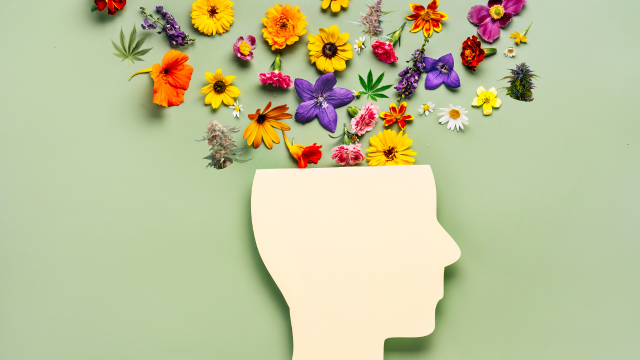Are you at least 21 years of age or hold a valid medical marijuana card?
Daily Specials
{{ special.title }}
{{ special.description }}
*{{ note }}EARTHMED BLOG

Cannabis and Mental Health

As attitudes and legislation continue to shift in favor of cannabis legalization, it’s important to consider the long-term effects of cannabis on mental health. In recent years, cannabis has gained recognition for its potential therapeutic benefits, from alleviating chronic pain to easing symptoms of anxiety and depression. Simultaneously, concerns have been raised regarding its impact on mental well-being, with possible links to psychosis, cognitive impairment, and even addiction.
Due to the sheer variety of individuals who partake in cannabis consumption, there is a great deal of nuance on the topic of marijuana and mental health. the endocannabinoid system to the divergent experiences of individuals with varying mental health conditions
Negative Effects on Mental Health
Cannabis Addiction and Withdrawal
While cannabis is often perceived as a relatively benign substance, it's essential to recognize that, like any psychoactive substance, it carries the potential for addiction and withdrawal symptoms in some individuals. While cannabis addiction is less common compared to substances like alcohol or opioids, it can still happen.
When individuals who have developed a dependence on cannabis abruptly reduce or stop their use, they may experience withdrawal symptoms. While cannabis withdrawal symptoms are generally milder compared to other substances, symptoms like anxiety, irritability, insomnia, decreased appetite, restlessness, and mood swings are all possible.
Psychosis and Schizophrenia
Regular and heavy cannabis use may increase the risk of developing psychosis or schizophrenia later in life. Smokers who over-consume may start to experience alterations in their brain’s ability to communicate with the body and an overall disconnection from reality. It isn’t uncommon for individuals to feel these symptoms temporarily, but long-term effects can be dangerous for adolescents when the brain is still developing. The link between cannabis use and psychosis/schizophrenia is not fully understood, and it's essential for individuals to be aware of the potential risks associated with heavy or frequent cannabis use.
Positive Effects on Mental Health
Symptom Relief
Cannabis has shown potential therapeutic benefits for a variety of medical conditions. In Illinois alone, there are dozens of qualifying medical conditions for medical marijuana. In addition to the positive effects of cannabis that can help with physical conditions, cannabis has also been explored for its potential therapeutic effects on various mental health conditions. Cannabis has shown promise in reducing symptoms of PTSD in some individuals and may provide temporary relief from symptoms of anxiety. However, high doses of THC, the psychoactive component of cannabis, can exacerbate anxiety symptoms in some individuals and may increase the risk of panic attacks.
Stress Reduction
Cannabis strains particularly high in CBD can help reduce feelings of stress and anxiety. CBD interacts with the endocannabinoid system in the brain, which plays a role in regulating stress responses. Many CBD products are known to have “anxiolytic properties,” basically meaning that they’ll help with anxiety. CBD can modulate the activity of serotonin receptors in the brain, which are involved in regulating mood and anxiety.
Sleep Aid
Certain cannabis strains, particularly those high in THC, have sedative effects that can help promote relaxation and improve sleep quality. Individuals with insomnia or other sleep disorders may find relief from cannabis use, although it's essential to be cautious with dosage and timing to avoid disruptions in sleep patterns.
Mood Enhancement
Some individuals report experiencing mood elevation and feelings of euphoria after using cannabis. THC (tetrahydrocannabinol), the psychoactive compound in cannabis, can activate the brain's reward system and may help alleviate symptoms of depression or low mood in some individuals.
The long-term effects of cannabis on mental health are still being studied, and further research is needed to better understand its potential benefits and risks. Still, it's important to note that while some individuals may experience positive effects on their mental health with cannabis use, others may experience adverse effects or no change at all. As with any substance, individuals should approach cannabis use mindfully and consult with healthcare professionals if they have concerns about their mental health.
Have you noticed how cannabis impacts your mental health? Hit me up on social media, and let’s spark up a conversation about it!
{{ locations[0].name }}
{{ locations[0].address }}{{ locations[0].city }}, {{ locations[0].state }} {{ locations[0].zip }}
{{ locations[0].phone }}
Hours
Sun: {{ locations[0].hours_recreational.Sunday }}Mon: {{ locations[0].hours_recreational.Monday }}
Tue: {{ locations[0].hours_recreational.Tuesday }}
Wed: {{ locations[0].hours_recreational.Wednesday }}
Thu: {{ locations[0].hours_recreational.Thursday }}
Fri: {{ locations[0].hours_recreational.Friday }}
Sat: {{ locations[0].hours_recreational.Saturday }}
{{ locations[1].name }}
{{ locations[1].address }}{{ locations[1].city }}, {{ locations[1].state }} {{ locations[1].zip }}
{{ locations[1].phone }}
Hours
Sun: {{ locations[1].hours_recreational.Sunday }}Mon: {{ locations[1].hours_recreational.Monday }}
Tue: {{ locations[1].hours_recreational.Tuesday }}
Wed: {{ locations[1].hours_recreational.Wednesday }}
Thu: {{ locations[1].hours_recreational.Thursday }}
Fri: {{ locations[1].hours_recreational.Friday }}
Sat: {{ locations[1].hours_recreational.Saturday }}






